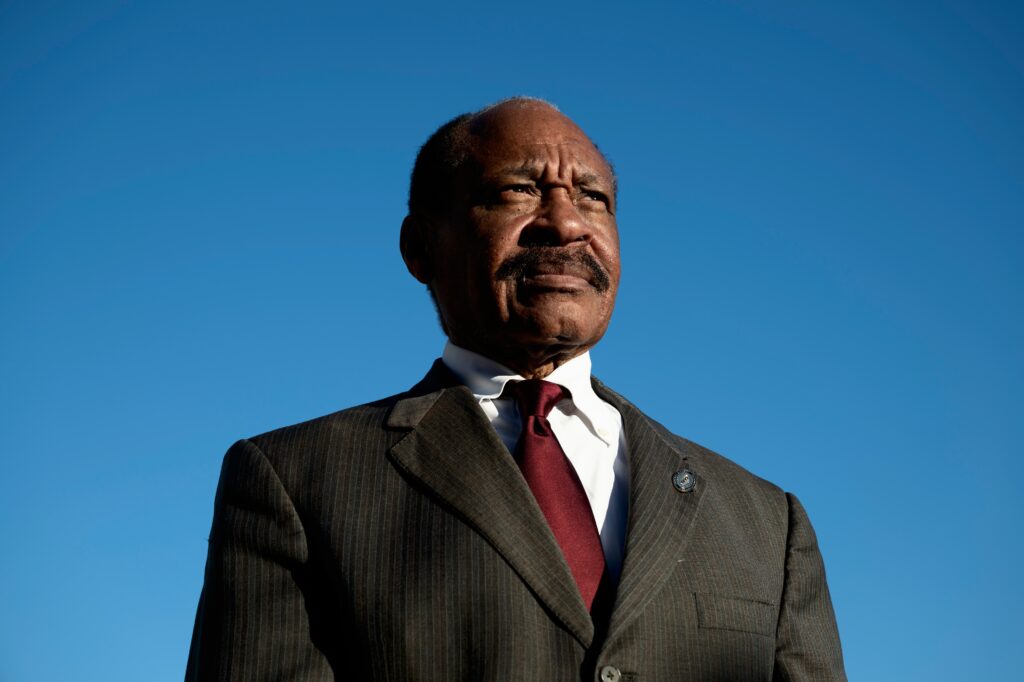Civil rights leader Carl Snowden trudges through a cemetery in Annapolis, toward two plaques affixed to two stones. One plaque names 10 men, mostly Black, lynched in Maryland between 1891 and 1906. On the second is a Portuguese expression, which translates to “the struggle continues.” It captures his philosophy on civil rights.
That memorial wouldn’t exist without Snowden. The same is the case for more than 15 Black history memorials around Anne Arundel County.
“We have had progress,” he said, smiling. “But we should never assume we’ve reached that zenith.”
The 72-year-old has devoted much of his life to ensuring Black history in Anne Arundel County, his home, isn’t forgotten. His latest effort will come to fruition on Nov. 22, when Anne Arundel County will formally apologize for slavery. Snowden, along with other civil rights leaders, asked for the apology, which will be announced by County Executive Steuart Pittman, whose ancestors owned enslaved people.
The apology comes more than 160 years after slavery was outlawed in Maryland.
“To do the right thing — there’s never a wrong time to do that,” Snowden said. “You’d be surprised how quick people can forget.”
The Maryland Hall event will start with historians offering remarks. Then Snowden will present the request, and Pittman will issue the apology. Forums will follow, and exhibits focusing on Black history will be on display throughout the day.
Evidence of the country’s most bitter transgressions against Black Americans can be seen all over Anne Arundel County. Centuries ago, City Dock in Annapolis was a functioning slave port. Many residents, both Black and White, can trace their lineage to slavery at plantations across the county. In the decades following slavery, mentally ill and poor Black Marylanders were brought to Crownsville Hospital Center outside Annapolis, medically experimented on and buried in graves marked only with numbers.
Much of that ill treatment went largely unacknowledged until recent decades, when Snowden and others started bringing attention to it through their work advocating for memorials and requesting apologies for systemic racism.
“Every community, every group has to have a Carl Snowden,” said Carroll Hynson Jr., a longtime financial supporter of Snowden’s work. “We’re blessed in a lot of ways to have Carl.”
Snowden and other local civil rights leaders raised the idea of an apology for slavery to Pittman at a meeting last June. The request felt especially timely, Snowden said, after actions by the Trump administration aimed at rolling back diversity requirements and requesting the removal of books written by Black authors from military academies.
Pittman, who said his family owned enslaved people at the Davidsonville farm where he lives, was immediately on board for a formal apology.
“It was a no-brainer,” Pittman said. “When government does something that horrible, it needs to be recognized and apologized for.”
But not all the county’s civil rights leaders view the apology as completely positive. For Steven Waddy, president of the Anne Arundel County branch of the NAACP, the words are empty without action. The organization’s executive committee asked that its name be pulled from the statement requesting the apology.
“The apology is about White people,” Waddy said in an interview. He said he sees it as an effort to absolve White descendants of enslavers in Anne Arundel County of their guilt without requiring any real sacrifice. Any meaningful progress in this arena would include reparations, he said.
“Without having any action associated with the apology, then this is kind of hollow and performative,” Waddy said.
Maryland Gov. Wes Moore (D) vetoed a bill this year that would have required the state to study the economic harm Black descendants of enslaved people have suffered and recommend remedies.
Anne Arundel County is exploring the possibility of creating a local reparations program, Pittman said. He said he’s committed to reviewing reparations proposals, but Black leaders have asked him to stay out of it for now as they hash out details.
“They said we want this to come from the community,” Pittman said.
Snowden, who said he descended from enslaved people in Anne Arundel County, sees the apology differently.
It is “not a panacea. It won’t solve all the problems slavery created, but it begins the acknowledgment that it even existed,” Snowden said. “There are people that don’t even want to acknowledge the existence of slavery or the existence of racism or discrimination. It’s a beginning point.”
For Snowden, every step in recognizing Black history serves the larger goal of uplifting all Black people. That is why he has devoted most of his life to local civil rights activism.
He’s done some of the work professionally from government positions, including as the inaugural civil rights director for the Maryland Attorney General’s office and as an Annapolis city council member. But much of this work — running civil rights groups, lobbying lawmakers, honoring people at banquets and building Black history memorials across the county — he’s done as a private citizen.
Snowden was 15 when he read “The Autobiography of Malcolm X.” It awakened him, he said, to the extent of racial injustices in America’s past. Soon, he organized a protest at Annapolis High School over the exclusion of Black history from the curriculum. He was expelled, he said, and enrolled in another school, but the incident sent him on a path of activism. Memorials quickly became a key piece of that work.
They “are a pathway to the past and a guidepost to the future,” Snowden says. They’ll “go on far after many of us have left the world.”
One of the most prominent memorial projects Snowden spearheaded was a towering statue of the Rev. Martin Luther King Jr. on the campus of Anne Arundel Community College. It was dedicated in 2006.
The purpose was simple: Snowden wanted the students to know who King was. As generation after generation walked through campus, their lives farther and farther detached from the most significant figures of the civil rights movement, Snowden wanted to ensure they saw an everlasting reminder.
Some memorials are more focused on local history. A plaque on Clay Street in Annapolis characterizes the thriving Black neighborhood that existed before parking lots and office buildings. A marker adhered to a wall outside the Graduate Hotel several blocks away commemorates the site of a 1960 sit-in at the restaurant that used to be there.
“That will last forever. It doesn’t go away,” said Hynson, who grew up on Clay Street. Snowden is “making sure we are remembered.”
Perhaps the most recognizable memorial Snowden worked on is one dedicated to the book “Roots” by Alex Haley. The installation, which was finished in 2006, features a statue of Haley reading to children steps from the water at Annapolis’s City Dock. Haley did research for the book in the city.
Creating these memorials didn’t come without political and financial challenges. Snowden put his house up as collateral to acquire a loan and meet a financing requirement to fund the King statue, he said.
In Snowden’s eyes, the nation’s first Black president and the state’s first Black governor wouldn’t have been possible without the figures and events he’s memorializing. All of that momentum could stop if the progress up until this point is taken for granted and those figures fade into the past, he said.
“If we don’t work to preserve our history and make sure it is not lost, who will?” he said.
In May, he’ll dedicate his final monument, a two-sided structure honoring Malcolm X, outside the Michael E. Busch Annapolis Library.
He’s asked more than 100 Marylanders, from artists to writers to religious leaders, to write notes envisioning what race relations will look like in 50 years. He’ll enclose them in a time capsule and bury it beside the memorial. Snowden plans to task his 2-week-old great-granddaughter, Azalea, with unearthing it in 2076.
Snowden has a clear image of the world he wants Azalea to live in — one where the “beloved community” King preached about is a reality and the brotherhood and sisterhood Malcolm X urged people to embrace is realized.
“I love to envision a world where fascism doesn’t exist, sexism is no longer an issue, racism has been eradicated,” he said. “That’s the kind of world I dream that she’ll be able to inherit.”
The post After a lifetime championing Black history, he finally got an apology for slavery appeared first on Washington Post.




